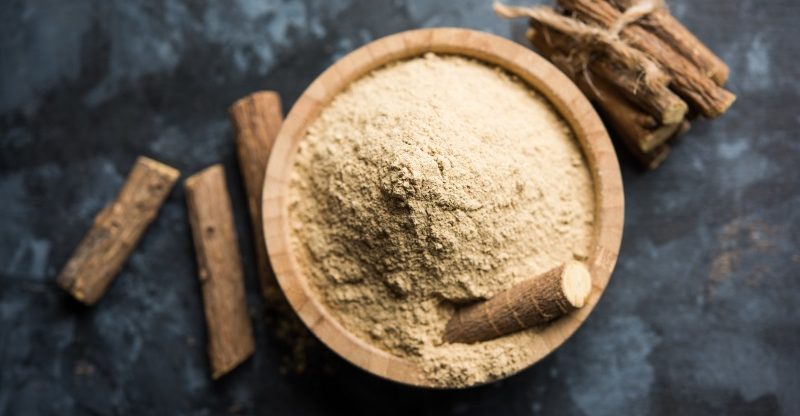15 Evidence-Based Benefits of Licorice Root
If you read this title and thought, “Candy is good for your health?” you would be partly right!
It turns out that the same plant that gives us the sweet, distinctive flavors that are used to make licorice candy, also supplies many essential health benefits to our bodies.
Unfortunately, eating candy will not help you tap into these health advantages.
Therefore, you will need to learn more about how licorice root can be used to improve your fatigue, lower your inflammation, and protect your heart and brain from damage and disease.
Understanding Licorice Root
Glycyrrhiza glabra is the scientific name for licorice root.
It is native to various parts of Asia and Europe.
While there are other species of this plant that are sometimes used, this is the most common type and the one we will be discussing in depth here.
The licorice plant is a perennial legume and has similar flavors.
However, it is not botanically related to fennel, star anise, or anise, which some people believe.
The extract of this plant, especially the root, has been used in traditional medicine and herbalism for centuries in Ayurveda, Traditional Chinese Medicine and the healing traditions of the Middle East.
The extract of the licorice root is very sweet.
It is usually at least 30 times sweeter than standard sugar.
This is why it has been used to make confections.
The Chinese have known about licorice’s anti-inflammatory properties for thousands of years.
They have used it to treat hormonal problems, respiratory issues, and gastrointestinal disorders (1).
Even the ancient Romans and Greeks appreciated this root’s benefits (2).
Modern manufacturing and extraction processes allow for the extraction of not only the sweet flavor but also the many medicinal properties that can be found in the licorice root.
It is such a favorite flavor that imitators, like star anise, are sometimes used to flavor “licorice” candies.
However, even in the small amounts found in candy, licorice has potent effects.
These effects are sufficient to prompt informational notices to consumers from the FDA (3).
Licorice Extract v. DGL
There are many natural compounds that makeup licorice.
They include several beneficial phytochemicals and compounds that can benefit human health.
One of these compounds, glycyrrhizin, can result in adverse effects when taken in large amounts.
To avoid these potential problems for certain parts of the population, this compound has been removed from certain licorice supplements.
It is known as deglycyrrhizinated licorice, or DGL (4).
We discuss the many compounds and components found in licorice root in more depth below.
We will then address the precautions that are necessary if you consume regular licorice extract or supplements, instead of the DGL varieties.
The Chemical Composition
Most of the 134 various compounds found in licorice root, fall within one of three broad categories.
They are either:
- Flavonoids, which have high concentrations of antioxidants and act as anti-inflammatories.
- Triterpenoids, which are chemical structures that can be used in steroidal substances and other phytochemicals with health benefits.
- Stilbenoids, which are polyphenols with properties that are most often antimicrobial or anti-inflammatory.
The most active compound found in licorice is glycyrrhizin.
When this compound enters your digestive system, your body transforms it into glycyrrhetinic acid.
This acid is known to convert cortisone into cortisol, thus resulting in licorice’s ability to raise cortisol levels in the body (5).
Another critical part of the licorice root is glabridin, which is a powerful flavonoid.
Glabridin is a potent anti-inflammatory as well as an antioxidant with neuroprotective capabilities (6).
Among the many properties that make this compound beneficial, are its capacity to regulate the metabolism of energy as well as act on estrogen receptors and antioxidant effectors (7).
Another type of flavonoid, glabrene, is also found in licorice root.
It is also known to bind to estrogen receptors in the body (8).
This compound benefits heart and bone tissues, by mimicking estrogen.
One of the polyphenols found in licorice root, Licochalcone A (LicoA), has antibacterial, antiparasitic, and anticancer properties (9).
Lico A stops the inflammatory response and suppresses certain signaling pathways that contribute to cancer growth.
Health Benefits
Licorice root’s compounds and phytochemicals are helpful for addressing and managing a wide range of health issues.
While it has traditionally been used to treat gastrointestinal problems, we are constantly learning about how this root can help address other chronic and acute medical issues.
These are the most studied and widely recognized benefits of this herbal treatment.
Reduces Inflammation
Over years of studies and research, licorice root has consistently been effective at reducing inflammation (10).
By enhancing the production of T cells, licorice may be able to offer protection from a wide range of inflammatory and autoimmune disorders and conditions (11).
By stopping pro-inflammatory activity in the brain, licorice root can also prevent neurodegeneration and promote health neurons (12).
It is even effective at reducing the inflammation associated with liver injury and disease (13).
When applied topically, licorice root can reduce the inflammation that causes eczema and other skin conditions as effectively as conventional treatments (14).
These anti-inflammatory effects also apply to joint pain, allowing for reduced pain and increased range of motion in sufferers (15).
Addresses Gut Problems
Licorice root was traditionally used to help with digestive problems.
Even before the exact mechanisms for healing were understood, this was an excellent use for this root.
Licorice root can be used to treat a number of gut problems, including ulcers, acid reflux, heartburn, constipation and gut inflammation that can lead to chronic inflammatory problems.
The bacteria responsible for gastric ulcers is Helicobacter pylori, and licorice root is effective at inhibiting and killing this microbe (16).
In animal trials, licorice root was able to decrease the size and number of gastric ulcers (17) as well as lead to fewer symptoms, including pain, indigestion, and nausea (18).
When treating peptic ulcers, the inclusion of licorice root can greatly increase the chances of success in eradicating H. Pylori, while also improving patient symptoms (19).
You do not need to have a stomach ulcer to enjoy the benefits of licorice root for your digestion.
The licorice root extract has been shown to reduce general stomach pain, nausea, and indigestion, while also calming heartburn (20).
For those with more chronic digestive troubles, such as from a leaky gut, licorice root can also help.
As a natural anti-inflammatory, licorice root soothes the stomach lining and reduces the inflammation that leads to chronic symptoms (21).
This herbal treatment can even help to keep your bowels moving regularly, by promoting the muscle contractions that prevent constipation (22).
Including licorice root in the daily diet has long been recommended in some cultures to promote effective colon health.
Can Protect Your Heart
Because of the effects of glycyrrhizin and glycyrrhizic acid on blood pressure and potassium levels, the results discussed here are only related to DGL varieties of licorice root.
Patients with high cholesterol can receive many benefits to their heart from regular consumption of DGL, including lowered cholesterol levels, decreased blood pressure and even lower levels of LDL or “bad” cholesterol (23).
Licorice root may also mitigate heart tissue damage and enable your heart to heal from the disease more readily, due to its high levels of anti-inflammatories and antioxidants (24).
Can Protect Your Brain
Licorice root contains an important flavonoid called glabridin, which can help to protect your nervous system, in the event of a stroke (25).
The protections offered by licorice root can even decrease the brain cell death associated with seizures (26).
For those with diabetes, protecting your brain from the effect of too much blood glucose is important.
Licorice root’s flavonoids can preserve cognitive function and reduce your risk of developing memory or cognitive problems due to diabetes (27).
This benefit was even noted in those subjects with healthy blood sugar levels.
Prolonged and excessive brain inflammation can lead to neurodegeneration and diseases like dementia and multiple sclerosis.
Therefore, protecting the brain from these effects is key for long-term health and healthy aging.
When you inhibit inflammation in the brain, you protect neuron health and maintain healthy brain function (28).
Combats Fatigue
Chronic fatigue can be caused by several conditions, most of which generate a decrease in cortisol levels.
By inhibiting the production of enzymes that convert cortisol into cortisone or those that eliminate this steroid hormone from the body, licorice root can increase cortisol hormone levels and boost energy levels (29).
One of the polyphenols found in licorice root could be the key to reducing exercise-induced fatigue, allowing users to work out longer (30).
More research is needed to determine if animal trial results can be applied to humans.
Promotes Adrenal Health
One of the scourges of modern society on our health is an elevated level of stress.
Because we live with higher and more chronic levels of stress than at any time in history, our bodies are working overtime to produce stress hormones to help us manage this influence.
Your adrenal glands, which are part of the endocrine system, are responsible for regulating and producing many of the hormones that are produced in response to stress.
Cortisol is the most common hormone released during stress.
Licorice root increases your ability to more effectively regulate your level of this hormone, which places less strain on your adrenal glands.
This allows them to function better (31).
Using licorice root to improve your stress response, allows your adrenals to rest more, work more effectively and experience less fatigue.
Can Help You Lose Weight
There is evidence suggesting that licorice root could be used to enhance weight loss efforts and help you shed excess fat.
In animal trials, licorice root helped subjects burn more fat during exercise (32).
It was also able to slow weight gain and fat deposition (33).
Helps Fight Cancer
Licorice root’s compounds could be used in the future to help treat and prevent cancer.
When tested in cell studies, licorice root’s components were effective at lowering many cancer markers, including inhibiting cell death resistance, inflammation, cellular proliferation and even the ability of cancer cells to make their own blood vessels.
The more these effects are tested in clinical trials, the more we will learn about licorice root’s true ability to fight cancer in people.
We now know that licorice root is toxic to human cancer cells (34), that it blocks the proliferation pathways for cancer cells (35) and that it prevents cancer cells from growing (36).
It can even prevent tumor formation and keep certain estrogens from binding and causing cancer (37).
Helps You Breathe Easier
Licorice root was commonly used in traditional medicine to treat respiratory problems.
We are now learning more about how this herb can cleanse the respiratory system.
Oral supplementation of licorice root can encourage the production of mucus, which your body needs to cleanse and moisturize your airways.
Clean, healthy mucous coats our bronchial passageways and keeps germs and contaminants from causing breathing problems.
This means that licorice root can keep you from getting sick with respiratory illnesses.
Reduces Hormone-Related Problems
Both men and women can receive help from licorice root’s ability to reduce hormone fluctuations and improve your body’s natural ability to regulate and produce the necessary reproductive hormones.
For example, licorice can help women who are experiencing menopause to reduce the severity and frequency of hot flashes, because of its estrogen-like properties that mimic the lost hormones from menopause (38).
For women with polycystic ovary syndrome (PCOS), the compounds in licorice root may be able to reduce symptoms.
The glycyrrhetinic acid in this herbal treatment naturally reduces testosterone levels, while also promoting regular ovulation (39).
For men, licorice root can help to increase sperm production, which could improve male fertility over time (40).
Fights Infections
By stimulating the immune system and supplying protection against free radicals and oxidative stress, licorice root boosts the immune system and offers protection from a number of invaders.
This root was traditionally used as an anti-fungal, antiviral, and antibacterial compound.
It is still be used in this way today.
The glycyrrhizic acid found in pure licorice root extract can control the growth of bacteria (41).
This includes killing the forms of bacteria found in the mouth that lead to tooth decay and gum disease (42).
Its ability to inhibit the growth of bacteria in the mouth means it could be an effective treatment for many forms of oral bacteria.
Licorice root may also be used to treat more serious infections, such as hepatitis C.
This infection is caused by a virus that attacks the liver. It can lead to long-term health problems and liver damage if it is left untreated.
The compounds in licorice root are known to inhibit the activity of the virus that causes hepatitis C.
Clinical trials in Japan to show promise in using injected compounds found in licorice root to treat this disease, which is often unresponsive to traditional medical interventions (43).
Boosts Your Immune System
If you want to boost your immune system’s ability to fight pathogens, licorice root could be the answer.
In addition to fighting chronic diseases like hepatitis C, the compounds in this herb can help you combat acute illnesses caused by influenza, as well as other viruses (44).
Taking this herb enhances your immune system’s activity, giving you a better chance of beating infections from unwanted pathogens that find their way into your system.
Helps with a Sore Throat
If you have a sore throat, licorice root can help soothe your pain.
Gargling with a solution that included licorice root was shown to lessen the severity of postoperative throat pain in one clinical trial (45).
This confirms additional research that shows that the compounds in licorice root coat the throat and provide effective relief from sore throats, even those caused be breathing tubs and other surgical interventions (46).
Improves Your Skin
If you have eczema or other inflammatory skin disorders, licorice root may be able to help.
An inflammatory response within the body causes the itching, redness, and scaliness of eczema.
In addition to lowering inflammation, licorice root can also help to protect you from developing secondary infections that may occur when you scratch irritated skin, such as during an eczema flare (47).
This study also showed how licorice root could protect you from all sorts of skin infections, including folliculitis, cellulitis, impetigo, and even staph infection.
Enhances Your Sleep
Getting enough sleep is vital for your overall physical and mental health.
To understand sleep, you must understand GABA or Gamma-Aminobutyric acid.
GABA is a neurotransmitter, which allows brain cells to communicate with one another.
GABA is an inhibitory neurotransmitter, which means it slows down or stops this communication in the brain and central nervous system.
The right amount of GABA is needed to induce relaxation, reduce stress and allow you to achieve restful sleep.
The compounds found in licorice root induce sleep, by activating GABA receptors in the brain.
This allows you to fall asleep faster and sleep with fewer interruptions (48).
Using Licorice Root Effectively
There are several methods for using licorice root to improve your health.
One of the easiest ways to enjoy these advantages is to drink licorice root tea.
You can also supplement licorice root by taking chewable tablets, capsules, liquid extracts and powders.
You can mix these supplements with oils or balms to treat skin conditions.
Adding extract to tea or water can help with digestive problems.
You should always use licorice root and other supplements, as directed on the package label.
If you take certain medications, such as blood thinners or medications for hypertension, talk with your doctor before using licorice root supplements regularly.
No one should use licorice root for extended periods, without discussing its use with your doctor.
Precautions
Most of the adverse effects of licorice root can be avoided if you choose DGL varieties of the herb rather than pure extracts.
Taking large doses of standard licorice root has been shown to increase cortisol levels, which can result in hypertension, elevated blood sugar levels and other immune system responses associated with high levels of stress (49).
Because sustained use of pure licorice root, rather than DGL, increases the half-life of cortisol, this stress hormone will remain in your blood longer, which can lead to high blood pressure (50).
For those with hypertension, it is recommended that you refrain from using licorice root or use only DGL varieties of the herb.
The increase in adrenal function brought on by licorice root can also lead to decreased potassium levels if supplementation is chronic or at extremely high levels (51).
Several of the compounds found in licorice root affect liver enzymes and can slow the metabolization of drugs.
This could have the effect of enhancing the concentration of the compounds in your system, thereby increasing any possible side effects (52).
Because of the influence of licorice on cortisol levels, heavy or extended use of the herb is not recommended for pregnant women, since it can lead to preterm delivery and low birth weight.
While this effect has not been thoroughly studied, the influences of licorice root on fetuses or young children are unknown and, therefore, should not be tested at home.
Conclusion
Licorice root is an ancient herb with modern-day applications.
Using this root can help you reduce inflammation, boost your immune system and allow you to fight many common diseases.
In addition to helping to treat many digestive troubles and relieving sore throat pain, licorice root can lower inflammation, fight viral infections, support your adrenals and other hormone systems and protect you from cancer.
If you want to use licorice root for your health, talk with your doctor, since it may interfere with some medications or make some conditions worse.
FDA Compliance
The information on this website has not been evaluated by the Food & Drug Administration or any other medical body. We do not aim to diagnose, treat, cure or prevent any illness or disease. Information is shared for educational purposes only. You must consult your doctor before acting on any content on this website, especially if you are pregnant, nursing, taking medication, or have a medical condition.
HOW WOULD YOU RATE THIS ARTICLE?





